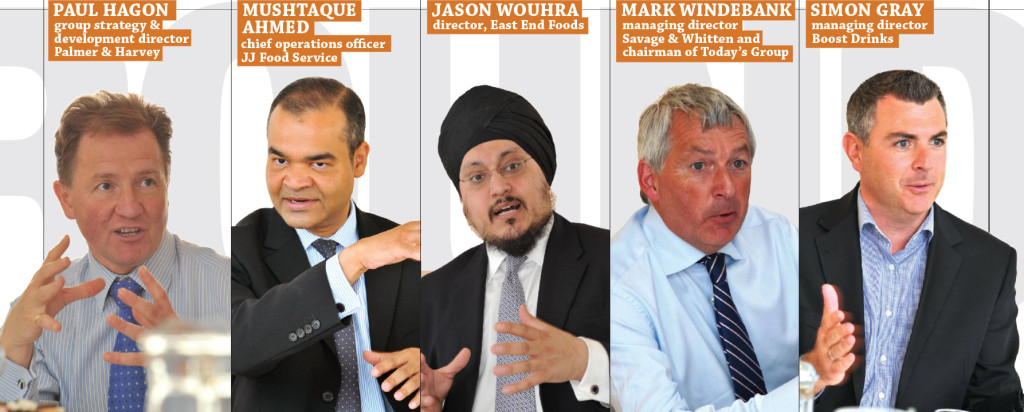Better Wholesaling brought together four leading wholesalers and suppliers to discuss key issues impacting the channel.
In part one of our Summer Roundtable, delegates consider how technology is driving improvements in the channel and the opportunities – and challenges – presented by data. In part two, wholesalers and suppliers outline the biggest opportunities and the barriers to growing category sales. Elit Rowland reports.
BW: How is technology improving supply chain efficiency?
Tommi: We help wholesalers to improve the visibility of their products and promotions. We helped JJ to reduce its order processing time by 25% and its overall inventory range for non-performing items by 15%. Five or 10 years ago, technology wouldn’t have allowed this.
Paul: Our web sales are going up 40% year on year. We’ve invested in SO99, which enables us to do forecasting to improve availability. Our vehicle scheduling is done on Roadnet, which has saved us millions of pounds in just three years.
Mushtaque: 50% of our business is done through click & collect and we have invested a huge amount to improve service to customers, including the launch of a digital platform, FOODit, that puts our foodservice customers online.
Mark W: 50% of our sales are through online ordering. Investment in real-time data helps us to improve accuracy and service levels, and to forecast sales. It also helps to make communication with suppliers and customers quicker and easier.
Jason: We are not as advanced as some other wholesalers, but we are keen to pick up the pace. We are a traditional cash & carry but even for small operators, technology is becoming mainstream. If you’re not keeping up, you will get left behind.
Elit: Is there more that buying groups can do to help members with this?
Jason: Yes, I could imagine going to a central Landmark portal that would redirect you to the relevant cash & carry. This sort of collaboration and ‘group approach’ would be better.
Mark W: I think that Today’s Group could develop technology that members can buy into, which they might otherwise not be able to afford. When you’re dealing with so many independent members, it’s difficult to develop technology as quickly as some of the national operators can.
Mushtaque: There is a perception that technology is expensive, but you can get many cheap apps that can have much bigger impacts on the business in terms of cost savings and operational efficiencies. Suppliers are offering ‘try before you buy’ and minimum contracts. Technology is no longer just about multi-million pound investments.
BW: How can we improve the way we operate with technology?
Mushtaque: There needs to be one version of the truth – you can’t have different, disjointed systems that don’t talk to each other. We have a single system to run our business so that our vehicles, HR, telesales, financial controllers, CEO and so on are all looking at the same thing.
Mike: Traditionally, transparency and wholesale are not two terms often put together. A majority of wholesalers have separate silos for customers, operations and suppliers. But none of them are connected. There is a lack of visibility.
Mark H: I agree – we have much greater visibility with the multiple sector and in real-time. The sooner I can see what’s happening, the sooner I can react.
Paul: It’s important to remember that having all this data can also change relationships. Suppliers can become dependent on it. Once you’re on the ‘data road’, there’s no turning back.
Simon: You have to bring your business up to the same pace as where your customers are. Some retailers are doing all the social media, technology, etc, but some don’t work that way. Technology is driving lots of good things but it’s driving the unknown, too.
BW: What’s the biggest challenge with sharing data?
Mushtaque: There is a big cultural barrier – traditionally, wholesalers like to keep data to themselves. The other issue is how to fit thousands of suppliers into a system of forecasting. There is no magic solution that fits all suppliers and customers.
Tommi: Does anyone share forecasts or order plans? Is this something that we can do in the future?
Simon: There needs to be a collective appreciation of the minimum we need to do – we need to get the basics right and try to understand wholesalers’ needs, rather than try to change their businesses.
Jason: Some suppliers aren’t getting the fundamentals correct. You can’t have good growth if your account manager is poor. We piloted a scheme with JTI about distribution – they took data from our check-outs and picked up who wasn’t buying certain brands and incentivised them. We had a huge sales uplift. Without that technology and support, it wouldn’t have been possible.
Mike: I agree, data management is now a product in its own right – 10 years ago people wouldn’t even know what you meant.
Paul: But it’s important to get to the root of the data and ask: ‘Why did that happen?’ It has to drive people to ask questions, otherwise it’s just lots of data without insight.
Mike: That’s interesting. You’re talking about using data internally in very proactive ways. But if you speak to most wholesalers then they would just ask: ‘How much are you going to pay me for it?’
Mushtaque: Your own transactional data is the most important part of your business. Forget about how many Facebook ‘likes’ you can get or how many Twitter followers you have. Look instead at inside data first. The added value this could give to your business is unbelievable.
Simon: Wholesalers don’t need suppliers to tell them what the market looks like or what the best-sellers are when they’ve got all the data.
Mike: One of the biggest problems is that wholesalers are not sure what they want out of data – suppliers have a clearer idea. Wholesalers have a way to go in, knowing what questions to ask.









